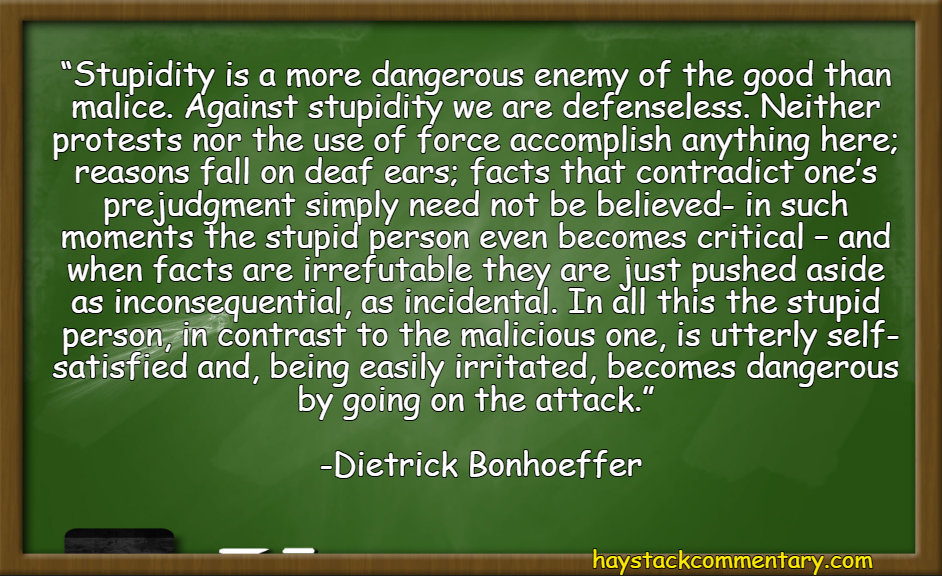Dietrich Bonhoeffer

Dietrich Bonhoeffer (4 February 1906 – 9 April 1945) was a German Lutheran pastor, theologian, anti-Nazi dissident, and key founding member of the Confessing Church. His writings on Christianity's role in the secular world have become widely influential, and his book The Cost of Discipleship became a modern classic. Apart from his theological writings, Bonhoeffer was known for his staunch resistance to the Nazi dictatorship, including vocal opposition to Hitler's euthanasia program and genocidal persecution of the Jews. He was arrested in April 1943 by the Gestapo and imprisoned at Tegel prison for one and a half years. Later he was transferred to a Nazi concentration camp. After being associated with the plot to assassinate Adolf Hitler, he was quickly tried, along with other accused plotters, including former members of the Abwehr (the German Military Intelligence Office), and then executed by hanging on 9 April 1945 as the Nazi regime was collapsing.

Dietrich Bonhoeffer, a leader in the German Confessional Church, was arrested by the Gestapo in April 1943. A year later, he was jailed in Berlin’s Tegel prison. He was hanged by the Nazis at Flossenbürg concentration camp only two weeks before the camp was liberated by Allied armies.
But on April 30, 1944, Bonhoeffer was still very much alive, though imprisoned. He was mulling over the significance of what it meant to be a Christian in such trying times. Nazi Germany was testing Christian discipleship in a direct and crushing way. We in today’s Western society have not been tested in the same way.
Bonhoeffer had seen a tragic appeasement among Christians in Nazi Germany. Most church leaders and their flocks had gone along with the pagan and anti-Christian sentiments at the heart of Nazism. Only a few had spoken out, like those Germans who formed the Confessing Church. Bonhoeffer’s Christian faith as a member of this group was on the line, and so was his life.
When Bonhoeffer sat down to write a letter to his friend Eberhard Bethge on that day in 1944, the meaning of the Christian faith was uppermost on his mind. “You would be surprised, and perhaps even worried, by my theological thoughts and the conclusions that they lead to,” he wrote. “What is bothering me incessantly is the question: what Christianity really is, or indeed who Christ really is, for us today” (Letters and Papers From Prison, edited by Eberhard Bethge, page 279).
Christianity in Germany had become, in Bonhoeffer’s view, nothing more than pious talk and a sterile repetition of creeds. Those who call themselves Christians “do not in the least act up to it,” he wrote. Bonhoeffer was dismayed at the many German Christians who had sold out.
What about us?What happened to Christianity in Nazi Germany should send chills through us who call ourselves Christian. But it’s easy for those of us who live in democratic and nominally Christian nations to take Christianity for granted. Well more than half of Americans call themselves Christian. Some even consider the practice of Christianity be patriotic. It seems easy to be a Christian.
We may not be forced to face human tragedy and madness in the profound way Bonhoeffer and his community, the Confessing Church, did. But we can be overcome by the world in more subtle ways. For this reason, we all need to ask ourselves a basic question: What is Christianity? When we say, “I am a Christian,” what do those words mean for us who were born into a Christian world?
The word Christ is the foundation and basis of the words Christian and Christianity. It is logical to assume that Christ would also be the foundation and basis of Christianity, and of each Christian’s life. But as Bonhoeffer asked, who is Christ for us today? Where does he fit into our Christianity?
--Paul Kroll; Grace Communion International; THE MESSAGE OF JESUS: NEW LIFE IN CHRIST
But on April 30, 1944, Bonhoeffer was still very much alive, though imprisoned. He was mulling over the significance of what it meant to be a Christian in such trying times. Nazi Germany was testing Christian discipleship in a direct and crushing way. We in today’s Western society have not been tested in the same way.
Bonhoeffer had seen a tragic appeasement among Christians in Nazi Germany. Most church leaders and their flocks had gone along with the pagan and anti-Christian sentiments at the heart of Nazism. Only a few had spoken out, like those Germans who formed the Confessing Church. Bonhoeffer’s Christian faith as a member of this group was on the line, and so was his life.
When Bonhoeffer sat down to write a letter to his friend Eberhard Bethge on that day in 1944, the meaning of the Christian faith was uppermost on his mind. “You would be surprised, and perhaps even worried, by my theological thoughts and the conclusions that they lead to,” he wrote. “What is bothering me incessantly is the question: what Christianity really is, or indeed who Christ really is, for us today” (Letters and Papers From Prison, edited by Eberhard Bethge, page 279).
Christianity in Germany had become, in Bonhoeffer’s view, nothing more than pious talk and a sterile repetition of creeds. Those who call themselves Christians “do not in the least act up to it,” he wrote. Bonhoeffer was dismayed at the many German Christians who had sold out.
What about us?What happened to Christianity in Nazi Germany should send chills through us who call ourselves Christian. But it’s easy for those of us who live in democratic and nominally Christian nations to take Christianity for granted. Well more than half of Americans call themselves Christian. Some even consider the practice of Christianity be patriotic. It seems easy to be a Christian.
We may not be forced to face human tragedy and madness in the profound way Bonhoeffer and his community, the Confessing Church, did. But we can be overcome by the world in more subtle ways. For this reason, we all need to ask ourselves a basic question: What is Christianity? When we say, “I am a Christian,” what do those words mean for us who were born into a Christian world?
The word Christ is the foundation and basis of the words Christian and Christianity. It is logical to assume that Christ would also be the foundation and basis of Christianity, and of each Christian’s life. But as Bonhoeffer asked, who is Christ for us today? Where does he fit into our Christianity?
--Paul Kroll; Grace Communion International; THE MESSAGE OF JESUS: NEW LIFE IN CHRIST
 Dietrich Bonhoeffer Files
Dietrich Bonhoeffer Files
“This much is certain, that it is in essence not an intellectual defect but a human one. There are human beings who are of remarkably agile intellect yet stupid, and others who are intellectually quite dull yet anything but stupid.”
--Dietrich Bonhoeffer was not just placing stupidity on the backs on the uneducated. He had seen too many intellectuals and well-educated fall under the spell of Hitler and the Nazis.
 Dietrich Bonhoeffer Files
Dietrich Bonhoeffer Files
"At this moment God is quite unreal to us, he loses all reality, and only the desire for the creature is real; the only reality is the devil. Satan does not here fill us with hatred of God, but with forgetfulness of God. And now his falsehood is added to this proof of strength. The lust thus aroused envelopes the mind and will of man in deepest darkness. The powers of clear discrimination and od decision are taken from us."
--Dietrich Bonhoeffer; Temptation
 Dietrich Bonhoeffer Files
Dietrich Bonhoeffer Files
“Stupidity is a more dangerous enemy of the good than malice. Against stupidity we are defenseless. Neither protests nor the use of force accomplish anything here; reasons fall on deaf ears; facts that contradict one’s prejudgment simply need not be believed- in such moments the stupid person even becomes critical – and when facts are irrefutable they are just pushed aside as inconsequential, as incidental. In all this the stupid person, in contrast to the malicious one, is utterly self-satisfied and, being easily irritated, becomes dangerous by going on the attack.”
--Dietrich Bonhoeffer
--Dietrich Bonhoeffer
 Dietrich Bonhoeffer Files
Dietrich Bonhoeffer Files
“Costly grace is the treasure hidden in the field, for the sake of it a man will gladly go and sell all that he has. It is the pearl of great price for which the merchant will sell all his goods. It is the kingly rule of Christ, for whose sake a man will pluck out the eye which causes him to stumble; it is the call of Jesus Christ at which the disciple leaves his nets and follows him.”
--Dietrich Bonhoeffer in his book, The Cost of Discipleship (P. 47)
 Dietrich Bonhoeffer
Dietrich Bonhoeffer
"The Christian needs another Christian who speaks God's word to him. He needs him again and again when he becomes discouraged, for by himself he cannot help himself …. He needs his brother man as a bearer and proclaimer of the divine word of salvation."
-Dietrich Bonhoeffer (Life Together)
Apr 9, 2015: Christian Apologetics Alliance: Bonhoeffer’s Solution to The Problem of Pain
Dietrich Bonhoeffer saw and experienced the unmistakable face of pain and suffering during the reign of Nazism in Germany.
Dietrich Bonhoeffer saw and experienced the unmistakable face of pain and suffering during the reign of Nazism in Germany.


